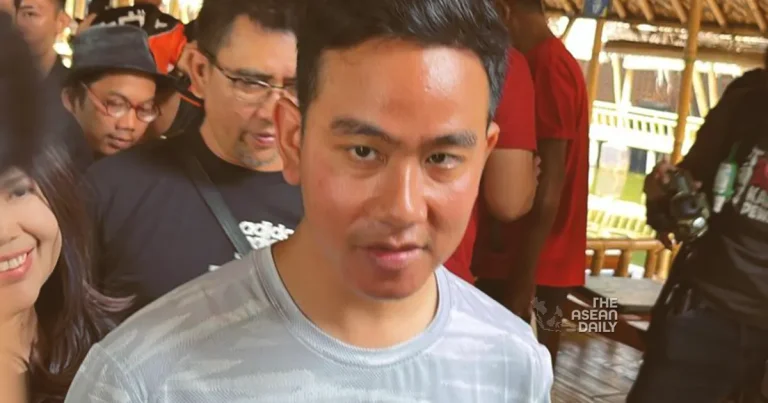23-10-2023 (JAKARTA) The Indonesian political landscape is rife with speculation of a burgeoning political dynasty as the Constitutional Court recently made a groundbreaking decision. The ruling stated that the longstanding 40-year minimum age requirement for Indonesian presidential and vice-presidential candidates does not apply to elected regional leaders. This verdict has potential far-reaching implications, especially for Gibran Rakabuming Raka, the eldest son of Indonesian President Joko “Jokowi” Widodo.
Despite being 36 years old, Gibran is now eligible to enter the 2024 presidential election race as a possible running mate for presidential candidate Prabowo Subianto, which had been previously impeded by the age limit.
Jokowi’s ascent in politics is unique as he didn’t hail from a political dynasty. He was a successful furniture businessman in Surakarta, also known as Solo, and rose through the ranks from being the mayor of Surakarta to the governor of Jakarta. However, in recent times, the outgoing president has faced accusations of establishing his own political dynasty.
The trend appears to continue with Gibran as the mayor of Surakarta potentially becoming a vice-presidential candidate. Notably, Jokowi’s youngest son, Kaesang Pangarep, recently took the helm as chairman of PSI, a youth-oriented political party. Furthermore, Jokowi’s son-in-law, Muhammad Bobby Afif Nasution, is currently serving as the Medan mayor.
In a curious twist, Constitutional Court Chief Justice Anwar Usman is married to Jokowi’s younger sister, Idayati, a fact that has raised eyebrows, although Chief Justice Anwar has maintained that there’s no conflict of interest regarding the decision.
This development has led some critics to dub the Constitutional Court as the “Family Court” rather than its intended function. It opens a new chapter in Indonesia’s political landscape, where family members of ex-presidents tend to dominate the field.
Megawati Soekarnoputri, the daughter of ex-president Sukarno, had aspired for her daughter, Puan Maharani, to become the presidential candidate for their party, the Democratic Party of Struggle (PDI-P). However, Puan, who holds the position of House of Representatives Speaker, struggled in electability surveys. Consequently, Megawati appointed ex-West Java Governor Ganjar Pranowo as her party’s president and Indonesia’s senior minister Mahfud MD as the vice-presidential candidate.
Former President Susilo Bambang Yudhoyono also desired that his son, Agus Harimurti Yudhoyono, be the running mate of presidential candidate Anies Baswedan but encountered hurdles in reaching an agreement. Yenny Wahid, the daughter of the late Abdurrahman “Gus Dur” Wahid, has been considered a suitable running mate for various presidential candidates but faced challenges in opinion polls.
Even in the Suharto family, with the late dictator being president of Indonesia, a family member is involved in the presidential race. Prabowo, the former son-in-law of Suharto, is vying for the presidency.
Surprisingly, there was no alliance between Jokowi and Megawati, both being members of the same party (PDI-P). This lack of cooperation hints at personal issues between the two families, with Jokowi not being consulted on Ganjar’s candidacy. Thus, if Ganjar is elected president, his allegiance will likely be to Megawati rather than Jokowi.
The upcoming 2024 presidential race can be seen as a proxy battle between “Ibu Ratu” (queen mother) Megawati and Javanese King Jokowi, with Anies playing the role of a spoiler. Jokowi has been subtly and strategically influencing the election, with some calling it “cawe cawe,” Javanese for “meddling.” Recent developments suggest his support for Gerinda chairman Prabowo while also appearing to back his PDI-P colleague Ganjar’s presidential bid.
With this support, Prabowo is expected to appoint Jokowi’s son, Gibran, as his running mate. If Prabowo wins, he will be indebted to Jokowi, while if Ganjar prevails, his presidency will be credited to Megawati.
Jokowi’s political maneuvering has created a fascinating dynamic, as it involves a former opponent, Prabowo, who lost to Jokowi in both the 2014 and 2019 Indonesian presidential elections, now becoming an ally. These intricate political layers add complexity to the presidential race and make it hard to predict the ultimate outcome.
In the lead-up to the election, the rivalry between “Ibu Ratu” Megawati and Javanese King Jokowi will undoubtedly intensify, with Anies, who is not the child of a former president, attempting to outmaneuver them both.




